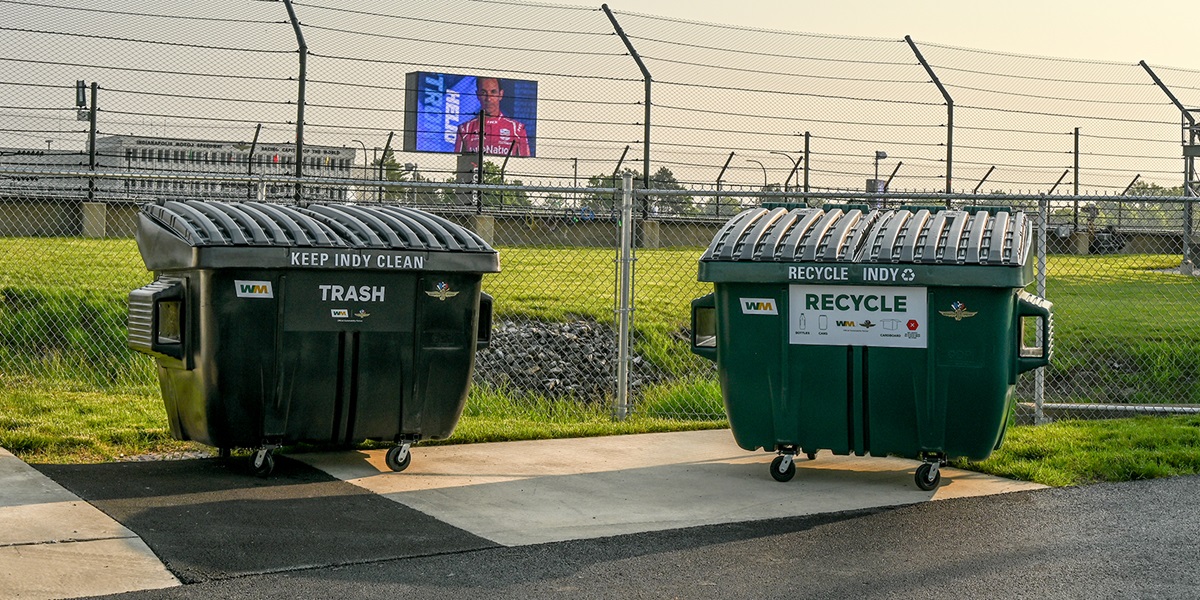
IMS Continues To Lead Sustainability Race Toward Zero
October 06, 2023 | By Curt Cavin, Indianapolis Motor Speedway
As the world’s largest spectator sporting facility, Indianapolis Motor Speedway has been a global leader in motorsports entertainment since it opened in 1909, and Friday, Oct. 6 it celebrates Green Sports Day as a leader in sustainability.
The venue visited by more than 800,000 fans annually is home to the Indianapolis 500 presented by Gainbridge along with a second NTT INDYCAR SERIES race, two NASCAR races, an IMSA race, the Shell Ecomarathon Americas, USAC’s National Midget Series, an SVRA event and an Intercontinental GT Challenge event.
Penske Entertainment, the parent company of IMS and INDYCAR, continually innovates to reduce the impact this traffic has on the local and global environment. Its guiding principles regarding sustainability are:
EVOLVING TRENDS: Continuously positioning IMS at the intersection of motorsports and sustainability by proactively exploring and adopting advancements in environmentally intelligent racing technology;
MAXIMIZING PARTNERSHIPS: Collaborating with brands that champion innovative, sustainable practices to accelerate IMS’ reach and impact;
REDUCE CONSUMPTION: Prioritizing the active reduction of emissions throughout IMS by focusing on energy upgrades and identification of efficiency improvements in buildings and business operations;
TRANSPORTATION SOLUTIONS: Transitioning equipment and vehicles to renewable and electric power and identifying solutions to logistical challenges facing the motorsports industry;
PROTECTING BIODIVERSITY: Maintaining and strengthening the integrity of a healthier local environment by continuing to preserve natural spaces on IMS properties that act as organic carbon sinks and bastions of biodiversity;
WASTE REDUCTION: Enhancing waste diversion efforts with a continued focus on reducing consumption and disposal of materials required for events and operations.
In 2021, the Indianapolis 500 became the first motorsports event to earn Silver Certification from the Council for Responsible Sport. The certification provides a structured approach for organizers to measure, implement, validate and improve the environmental and social impacts of their events.
IMS also received Silver Certification in January 2023 for its year-round operations of the entire venue. The certification validating implementation of all of CRS’ mandatory standards was the first given to a sports venue. IMS’ efforts included the completion of a greenhouse gas emissions inventory, venue upgrades to improve energy efficiency and reduce water usage, donating leftover food to Gleaners Food Bank of Indiana for redistribution, executing a campaign to encourage spectators to bike to the event instead of drive and providing onsite COVID-19 vaccinations.
The innovations did not stop there.
In 2023, IMS recycled more than 243 tons of material from events and operations that would have otherwise gone to landfill, up from 75 tons in 2022. Those numbers are a marked improvement from just three years earlier when the venue had no recycling program.
Food Donation (Gleaners): 8,361 pounds of food rescued, equating to 6,967 meals for the local community
Legends, the official IMS retail partner, has opened a fully sustainable store inside an electric truck. All items sold in the truck are reusable or designed from recycled plastic bottles. IMS donates leftover banners and other promotional materials that would otherwise go to a landfill to People for Urban Progress, a nonprofit organization that uses these materials to create clothing and accessories.
IMS has expanded its compost program, which has two components. The first is event-based food composting, and the second is operational composting of mixed yard waste. During events, RE317 hauls food scraps from catering kitchens, suites and concessions to GreenCycle, a composting facility in Indianapolis. Additionally, the IMS grounds team collects mixed yard waste from landscaping and mowing to compost at GreenCycle, a program launched in 2023. In total in 2023, IMS composted 20.1 tons of food waste, up from 13.5 tons in 2022.
According to the U.S. Department of Agriculture, upward of 40 percent of the nation’s food supply is wasted annually. Nearly one-third of that loss occurs at the retail and consumer level, and experts estimate more than $21 billion in food is wasted at U.S.-based events each year. Meanwhile, the waste accumulates as more people struggle with food insecurity, and 53 million Americans turned to food banks for help in 2021.
To tackle these problems, IMS launched a pilot project in May 2022 to reduce food and waste at the Indianapolis 500. On Race Weekend in 2023, more than 8,300 pounds of unused prepared food was stored, refrigerated and sent to Gleaners Food Bank of Indiana – equating to nearly 7,000 meals for the community and more than twice as much food as collected in 2022.
IMS offered direction for fans to participate in these efforts through videos featuring IMS President J. Douglas Boles. The videos include how to pack coolers for events, how to recycle when at the venue, how to purchase carbon offsets and how to ride share or bike to the track.
In May 2022, IMS, INDYCAR and their partners debuted a new eco-friendly Firestone Firehawk race tire at the Indy 500 Pit Stop Challenge on Miller Lite Carb Day. Those guayule tires were used at all NTT INDYCAR SERIES street course races in 2023.
IMS allowed fans to reduce their travel footprint through CHOOOSE, a carbon offset purchasing platform. These offsets supported the GreenTrees reforestation project, which restores and protects natural habitats in the Mississippi Alluvial Valley.
IMS also installed high-powered EV charging stations and transported all INDYCAR race tires to and from IMS via Freightliner eCascadia battery electric tractor trailers for the first zero emission tire transport solution in motorsports and made certain all electricity consumed at IMS in May 2022 was purchased through 100% Renewable Energy Credits. Souvenir shirts that were sold were made from recycled plastic bottles that saved 1 kilowatt hour of electricity and 2 gallons of water per shirt.
Through dedicated partnerships, operational improvements and innovative solutions, IMS will continue to drive progress toward decarbonization across the Racing Capital of the World.